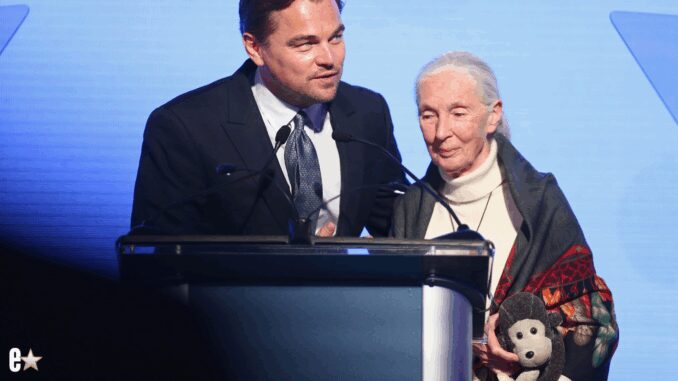
The Whisper and the Roar: Leonardo DiCaprio, Jane Goodall, and the Legacy of Conservation
The image is etched in my mind: Leonardo DiCaprio, a Hollywood titan, his voice thick with emotion, presenting an award to Jane Goodall, the woman who redefined our understanding of ourselves through the lens of chimpanzees. The scene itself, a confluence of fame and field work, speaks volumes about the power of influence and the urgency of our shared responsibility towards the planet. This "emotional tribute," as headlines proclaimed, was more than just a celebrity endorsement; it was a recognition of a lifetime dedicated to conservation, a bridge between two worlds – the glamour of Hollywood and the grit of the Gombe Stream – united by a common cause. It highlighted how Goodall's quiet observation, her unwavering dedication, had evolved into a roar, a rallying cry for the preservation of life on Earth.
Goodall's contribution to conservation transcends simply protecting chimpanzees. She challenged the very foundations of human exceptionalism. Before her groundbreaking research, the idea that primates could use tools, exhibit complex social structures, and possess individual personalities was met with skepticism. By meticulously documenting the lives of chimpanzees, she unveiled a mirror, forcing us to confront our own animal nature and shattering the anthropocentric view that separated us from the rest of the living world. This realization, that we are not masters of the universe but rather interconnected parts of a complex web, is the bedrock of modern conservation.
DiCaprio's tribute underscored this broader impact. His own commitment to environmental advocacy is well-documented, from funding conservation projects to producing documentaries that expose the devastating effects of climate change and habitat loss. By using his platform to honor Goodall, he wasn't just celebrating her individual achievements; he was amplifying her message, bringing it to a wider audience who might otherwise remain unaware of the dire state of our planet. This intergenerational dialogue – a veteran scientist passing the torch to a younger generation of activists – is crucial for ensuring that the fight for conservation continues.
Moreover, the "emotional" aspect of the tribute is worth examining. Emotions are often dismissed as irrational or sentimental in the scientific world, but they are, in fact, powerful motivators. DiCaprio's visible emotion resonated with the audience because it reflected the genuine concern and passion that many feel about the environmental crisis. Goodall, too, has never shied away from expressing her own emotional connection to the natural world, using her personal experiences and anecdotes to paint a vivid picture of the threats facing endangered species and ecosystems. This ability to connect on an emotional level, to inspire empathy and understanding, is essential for fostering a sense of responsibility and driving collective action.
However, the relationship between fame and conservation is not without its complexities. The potential for performative activism and greenwashing is always present. Critics may argue that celebrity endorsements are superficial, that they detract from the real work being done by grassroots organizations and indigenous communities on the front lines of conservation. While these criticisms are valid and require critical examination, they should not overshadow the potential for positive impact. When celebrities genuinely dedicate their resources and influence to raise awareness and support conservation efforts, they can play a vital role in mobilizing resources and galvanizing public opinion.
Ultimately, the emotional tribute from Leonardo DiCaprio to Jane Goodall serves as a potent reminder that conservation is not just a scientific endeavor; it is a deeply human one. It is about recognizing our interconnectedness with the natural world, acknowledging our responsibility to protect it, and finding the courage to speak out, even when faced with overwhelming odds. Just as Goodall's quiet observations in the forests of Gombe eventually transformed into a global movement, so too can our individual actions, no matter how small, contribute to a brighter future for our planet. The whisper of individual action, amplified by the roar of collective effort, is our best hope for ensuring that future generations inherit a world as rich and vibrant as the one we have been so fortunate to experience. This is the true legacy of Jane Goodall, and it is a legacy that Leonardo DiCaprio, and indeed all of us, have a responsibility to uphold.
